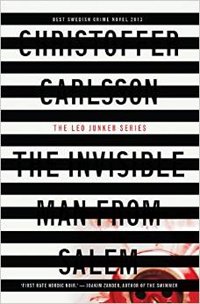
Translated by Michael Gallagher — Winner of the Swedish Crime Academy’s Best Crime Novel Award in 2013, The Invisible Man From Salem by Christoffer Carlsson is now available in the UK.
The book introduces us to the world weary, disgraced Internal Affairs officer, Leo Junker. When a young woman is found murdered in Junker’s apartment block, he bluffs his way onto the crime scene, despite his current suspension from the force, and sees that she is clasping a necklace – a necklace he is all too familiar with.
As Leo sets out on his own gung-ho investigation to catch the killer, a series of frightening connections emerge linking the dead woman to his own troubled youth in Salem, a Stockholm suburb where social deprivation and racial tension have a strong foothold. He’s forced to confront an incident long ago that changed his life forever. Leo finds himself absorbed back into the dangerous territory of his youth, desperately seeking a figure from his past, who is hell-bent on retribution and shrouded in mystery whilst also being seemingly impossible to track down.
Leo Junker is an interesting character. He has risen above his humble roots to pursue a career in the force. When he was head-hunted for the Internal Affairs division, trouble ensued as he was asked to spy on fellow members of the department. After an ill-fated criminal operation he fell from grace. However, he retains a steely determination to insinuate himself back into the front-line, particularly with his personal connection to this new case.
In some ways, Leo fits the typical portrait of fictional detectives. He’s desperately unlucky in love, and generally world weary. Whether this is due in part to the translation, there is no real vibrancy in him and little to make us empathise with him. He seems a little too self-absorbed throughout. When an ex-lover is drawn into the investigation, Leo comes across as just a bit too needy, and this is somewhat at odds with the picture that has been built up of him. Leo is harder to engage with than many other detectives in Scandinavian crime fiction.
There are a few odd episodes in the book where Carlsson seemed to be channeling Raymond Chandler’s Phillip Marlowe, through Junker’s personality and dialogue. However this is done inconsistently and confuses our perception of his character slightly with this tainted authorial voice.
A stronger aspect of the book is the representation of Salem. Here Carlsson truly succeeds in painting a vivid picture of the estate where Leo grew up. There is a highly visual depiction of the layout and housing, and the attendant social problems of this run-down and deprived area. With some of the focus being on Junker’s school years and the alliances he formed there, Carlsson captures well the voice of rebellious youth, and the overarching importance that people attach to the actions of their teenage years when looking back on them. Obviously, there is one extremely important event in our hero’s early years that impinges on the present, but the folly of youth and misguided actions are exceptionally well-depicted, particularly in relation to the killer himself.
The Invisible Man from Salem is a fairly satisfying read, with a couple of quibbles along the way. The author has a tendency to draw too heavily on some familiar tropes in crime fiction with the Marlow-esque narration sequences and some occasional anonymous narration by the killer himself. There’s a possible homage to Steig Larsson with a feisty tattooed girl too! Minor irritations aside, this is an enjoyable enough slice of Scandinavian noir for fans of the genre, and would not dissuade this reader from dabbling in the next in the series. That will be The Falling Detective, which was released in Sweden last year.
Here are eight other Nordic noir authors you should try, or have a look at Barry Forshaw’s top 10 Nordic classics here.
Scribe
Print/Kindle
£3.83
CFL Rating: 3 Stars









